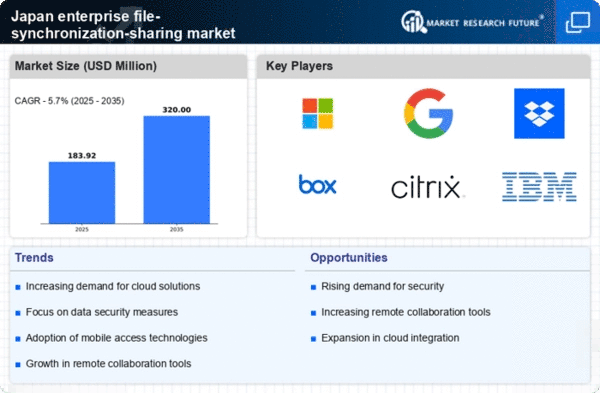Rising Demand for Remote Work Solutions
The enterprise file-synchronization-sharing market in Japan experiences a notable surge in demand for remote work solutions. As organizations increasingly adopt flexible work arrangements, the need for secure and efficient file-sharing systems becomes paramount. This shift is reflected in a reported growth rate of approximately 15% in the market, driven by the necessity for seamless collaboration among remote teams. Companies are seeking solutions that not only facilitate file synchronization but also ensure data integrity and security. The enterprise file-synchronization-sharing market is thus witnessing innovations aimed at enhancing user accessibility while maintaining robust security protocols. This trend indicates a broader acceptance of remote work as a long-term strategy, compelling businesses to invest in advanced file-sharing technologies.
Growing Importance of Collaboration Tools
The enterprise file-synchronization-sharing market in Japan is increasingly driven by the growing importance of collaboration tools. As businesses recognize the value of teamwork and communication, there is a rising demand for integrated file-sharing solutions that facilitate real-time collaboration. This trend is reflected in a market growth rate of approximately 14%, as organizations seek platforms that allow multiple users to access and edit files simultaneously. The enterprise file-synchronization-sharing market is adapting to this need by offering features such as version control, commenting, and task management within file-sharing applications. This emphasis on collaboration not only enhances productivity but also fosters a culture of innovation within organizations, indicating a shift towards more interactive and engaging work environments.
Increased Investment in IT Infrastructure
In Japan, the enterprise file-synchronization-sharing market is benefiting from increased investment in IT infrastructure. Organizations are recognizing the necessity of robust IT systems to support their digital transformation initiatives. This investment is projected to drive market growth by 11%, as companies seek to upgrade their file-sharing capabilities to accommodate larger data volumes and enhance security measures. The enterprise file-synchronization-sharing market is thus witnessing a trend where businesses are not only investing in software solutions but also in hardware and network improvements. This holistic approach to IT infrastructure development is likely to result in more reliable and efficient file-sharing systems, ultimately supporting the evolving needs of modern enterprises.
Regulatory Compliance and Data Protection
In Japan, the enterprise file-synchronization-sharing market is significantly influenced by stringent regulatory compliance and data protection laws. Organizations are increasingly required to adhere to regulations such as the Act on the Protection of Personal Information (APPI), which mandates strict data handling and sharing practices. This regulatory landscape compels businesses to adopt file-sharing solutions that not only comply with legal standards but also enhance data security. The market is projected to grow by 12% as companies prioritize compliance-driven solutions. The enterprise file-synchronization-sharing market is thus evolving to offer features that ensure data encryption, access controls, and audit trails, thereby fostering trust among users and stakeholders. This focus on compliance is likely to shape the future of file-sharing technologies in Japan.
Technological Advancements in File Sharing
Technological advancements play a crucial role in shaping the enterprise file-synchronization-sharing market in Japan. Innovations such as artificial intelligence (AI) and machine learning (ML) are being integrated into file-sharing solutions, enhancing their functionality and security. These technologies enable automated data classification, threat detection, and predictive analytics, which are essential for modern enterprises. The market is expected to expand by 10% as organizations seek to leverage these advancements for improved operational efficiency. The enterprise file-synchronization-sharing market is thus witnessing a transformation, where traditional file-sharing methods are being replaced by intelligent systems that adapt to user needs and security threats. This evolution indicates a shift towards more sophisticated and responsive file-sharing solutions.
















